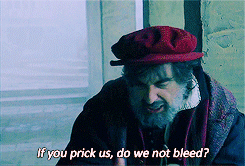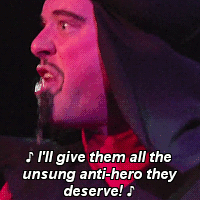Shy-locked in Place | The Progression of Villainy
One of the aspects of story-telling that’s never failed to capture my attention is that of a villain. Specifically, the progression from normal person to antagonist, and especially that of an unwilling sort. We see such progressions in characters such as Elphaba from Wicked, Ja’far of Starkid’s Twisted, and even some implications in The Son from the third season of Star Wars: The Clone Wars. In each situation, the role of evil is seemingly forced upon these characters, mostly of circumstances either outside of their control or simply a part of who they are. And while one wouldn’t necessarily say Shylock is a villain in this day and age, he most certainly was considered one by the majority of the other characters in The Merchant of Venice.
Some of those assigned the role of villainy try to fight off this apparent destiny. Many, eventually, succumb to their supposed fate, some even acknowledging that the role of villain is more assigned to them by others than properly adopted until they’ve reached a point of no return. Such examples can be seen in Elphaba’s solo No Good Deed or Ja’far’s heart-wrenching conclusion to the song Twisted. We see this progression in Shylock, too, particularly in act three of Merchant of Venice.
‘Are people born wicked’, asks the opening number of Wicked, ‘Or do they have wickedness thrust upon them?’ Skylock seems to suggest the latter for his case. And while the characters of Venice have about as much a claim to moral high ground as Anakin Skywalker in the midst of the Jedi Purge, we sympathize with where Shylock’s coming from. “Thou called’st me a dog before thou hadst a cause; But since I am a dog, beware my fangs (Merchant, III.iii.).” This particular quote is but a prime example of Shylock’s metaphorical fall to the dark side.
This progression doesn’t exactly catch anyone by surprise. In fact, we see we really see it come to a head in Act III, scene I, with Shylock’s famed speech. His appeal to the mutual humanity of both he and his Christian tormenters has the power to tug at the heartstrings, having us almost on his side.
Almost.
And that 'almost' gives us this painfully beautiful progression from 'not the nicest guy' to 'the monster everyone else created'. The fact the Shylock doesn't get his comeuppance in the end only further solidifies the tragedy of his character, leaving one only to wonder just how this tale would've been spun from his perspective.



Comments
Post a Comment